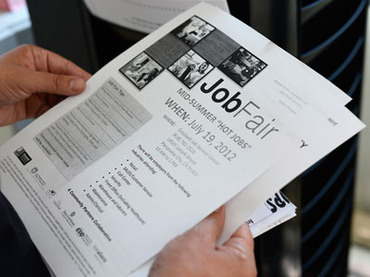
(AFP Photo)
A survey conducted by the jobsite Bayt.com and YouGov, a research and consulting organisation, revealed that 67% of Egyptian respondents believe their current salary is lower than that of other companies in their industry, with only 4% stating a high level of satisfaction with their current remuneration. Eight in 10 believe that the cost of living will continue to increase.
The majority (55%) of professionals gave a medium satisfaction response with their current salary, the Bayt.com annual survey salary showed. It also showed that a quarter of the survey’s Egyptian respondents (26%) have been in their current career path for up to three years. Almost one quarter (27%) have spent up to one year with their current employer, while 28% have been with them for four to seven years. Four in 10 (44%) have one to five people currently reporting to them, and 31% oversee six or more employees. The majority of survey respondents are either midway (33%) or fairly senior (34%) in their position.
Most Egyptian respondents have held either one (28%) or two (34%) jobs in the past five years. The majority claim that they spend on average between one and three years in a job, though 34% held a position for at least six years.
The preferred pay structure in Egypt is partially fixed wage with a variable pay for commissions and incentives, according to 47%, with the more preferable incentives being those that are performance-based (57%), or professional training and development courses (47%). Commission for business or revenue generated (30%) and holiday allowances or foreign trips (19%) are also popular.
In addition to this, the analysis showed that 28% of the participants claimed they did not receive a raise in 2012. The majority (25%) of those who did receive a pay increment were given 6-10%, but 49% are unhappy with the amount received.
In 2013, respondents from Egypt are torn with regards to receiving a raise: 39% expect to receive up to 15%, while 17% expect to receive more than 15%, while 20% do not expect anything.
Furthermore, 38% of survey participants stated that their cost of living increased by more than 15% in 2012, the study showed, mostly tying it to rising food and beverage costs (88%), entertainment (51%), and increased rent (48%). 83% believe that the cost of living will continue to rise in 2013. Only 26% of respondents save up to 15% of their monthly personal income.
“The results of the 2013 Bayt.com MENA Salary Survey suggest that salaries are not keeping pace with the rising cost of living in Egypt,’’ said Suhail Masri, vice-president of Sales at Bayt.com. “This is a general trend across the Middle East that companies must begin to address; in doing so, they will be able to contribute to building employee loyalty and satisfaction, and will have the opportunity to reduce the number of employees looking to change jobs within the next year,” Suhail said.
The study showed that to 50% of the respondents, loyalty to current employers is 70-100% linked to their remuneration. Other variables that strongly drive loyalty in Egypt are the respondent’s direct manager (39%), opportunities for long-term career progression (37%), colleagues and work environment (37%), and senior management (35%).
“Drivers of loyalty in particular are areas that employers in the region should consider, in order to slow what would seem to be a very transient workforce,’’ said YouGov CEO Sundip Chahal. “Employees across the MENA region seem overall dissatisfied with their current [salary] packages and the rising cost of living; if the two do not draw closer, then there could be potential economic difficulties in the coming years.’’
When asked whether salaries are increasing or decreasing in Egypt, 42% of respondents said that they are “increasing marginally”, with an additional 11% stating they are “increasing moderately” and 19% state that they are staying the same. Factors causing salaries in Egypt to increase are considered to be inflation and the rising cost of living (60%), growth in opportunities and economic growth (18%), and pay rises in the public sector (17%). Reasons for salaries not increasing are seen to be the poor economy (65%), employer-friendly laws (30%), and poor corporate performance and profitability (22%).
Survey participants believe that they enjoy a standard of life that is mostly either on par with or above the standard of other residents in the same generation; 42% state that their standard of living is “about average”, 26% claim to be “somewhat better off”, and 11% are “much better off”.
More than half (54%) of respondents intend to look for a better job in the same industry in the next 12 months, while 44% will look to other Middle Eastern countries for better jobs, and 27% will look for a better job in a different industry. This is likely because 24% of respondents believe that there is an excess supply of talent in Egypt.
Data for the Bayt.com MENA Salary Survey, May 2013, was collected online between 28 April and 5 May 2013. Results are reported on a base of 15,247 respondents. Countries that participated are UAE, KSA, Kuwait, Oman, Qatar, Bahrain, Lebanon, Syria, Jordan, Egypt, Morocco, Algeria, and Tunisia.




